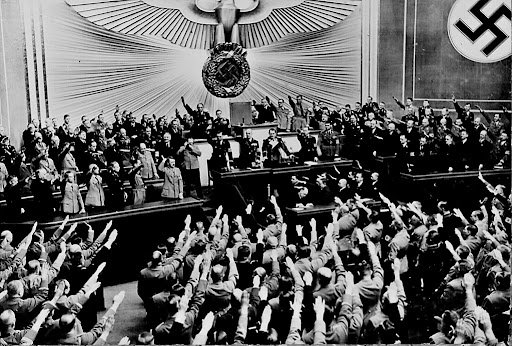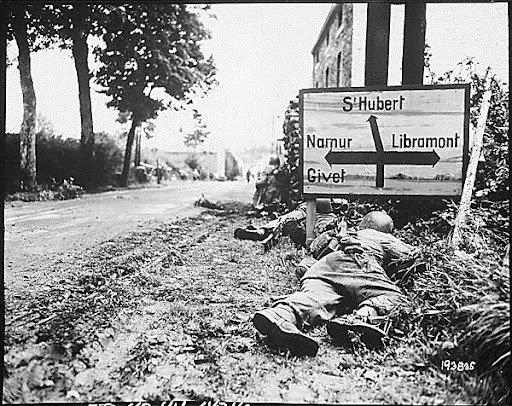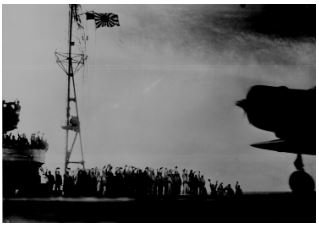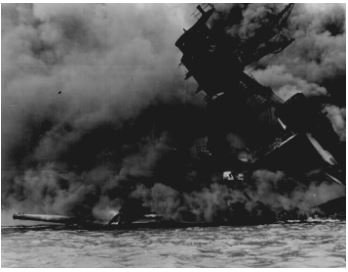How did World War Two start, and what was the cause of it? It happened because five events changed the course of history, and the first one was the attempted assassination of Adolf Hitler. We’ll go into more detail about that later. The USSR got dragged into another war. More official German records on Operation Cobra led to D-Day. Also, Woodrow Wilson's dream of a democratic utopia ended and did not last more than half a century. World War Two started because of one crisis after the next. We’ll then examine the role of Japan's attack on Pearl Harbour.
One: The Attempted Assassination of Fuhrer

It was called Operation Valkyrie. A series of conspiracies developed to take back political control of Germany as well as the German Army from the Nazis. There was also a desire for a Peace Agreement with the Western Allies. The main goal of the German Resistance in Wehrmacht, whose relevant players include General Ludwig Beck, Brigadier-General Hans Oster, and Erwin Von Witzleben, who was the deputy head of the Military Intelligence and former Chief-of-Staff of the German Army High Command, was to get rid of Hitler. However, the majority were conservative nationalists and did not believe in democracy. In 1944, the German High Command decided it was time to kill Hitler out of desperation to save their country from destruction by fighting a war on two fronts. Colonel Claus Von Stauffenberg went to Berlin with a briefcase, but it failed in the end, and Hitler survived because there were six attempts on the Fuhrer, and he thought providence saved him.
Want were the consequences of the assassination of Adolf Hitler in Germany at that time? We’ll never know the answer to that question. It would change the war's course for the Allies and lead to a long decade of the Third Reich. It would not have gotten rid of the evil regime in Germany at that time. In pre-Hitler Germany, civil servants moved up the ladder in the bureaucracy and were often seen as qualified. Both Goerdeler and his rival Konrad put their names on the list for the candidacy of the Reich chancellorship, but Goerdeler had criticized the Nazi Regime in the past. Like most people who hold government positions, they had a conservative disposition towards the Monarchy.
In 1936, the army marched into the Rhineland and took Austria, exploiting the crisis. The Czechoslovakian army command received the news at the conference that Hitler was planning a war at the Reich Chancellery. The burden fell on the professional soldiers doing their duties for the Fatherland because the army had sworn allegiance to him. It was no easy task to overthrow Nazi rule in Germany.
Everyone was under scrutiny by the regime, including those who may have made a remark or act of opposition to the Nazis at a cocktail party put under surveillance by the Gestapo, the secret police. Hitler abolished the Treaty of Versailles and became a savior in the eyes of many German people. These were dangerous times.
General Ludwig Beck was born to an upper-middle-class family in the Rhineland in 1880. A man of high morals and a central leader of the military resistance of the Prussian-German officer class just before World War One. The German army didn't get involved in politics. Wilhelm 11 prohibited any member of the armed forces from joining political parties and taking an interest in politics. In an unsuccessful attempt made on Hitler's life, an officer confessed to the Gestapo that Rommel had something to do with the conspiracy. Field Marshal Rommel was a commander in North Africa and won victories for the Axis powers.
Two: Soviet-Japanese Conflict
The Soviet Union put a lot of energy into the conflict by promoting Communism in China during the 1920s. In 1932, diplomatic relations were established with the Kuomintang Nationalist Regime in Nanjing by the Soviets, and they joined the League of Nations in 1935. But the Soviets were on friendly terms with China. On May 1927, Stalin declared that the revolution in China was anti-imperialist.
Outer Mongolia had been a Soviet satellite since 1921, although it remained part of China. Most border skirmishes were over aerial invasions, interference, water, and transport. The Soviet Government remained neutral about the struggle between Japan and China. The Soviets could not be impartial in their position in Manchuria. The Japanese had occupied most of Southern Manchuria. The Soviet Union kept a strict position on neutrality, and to quote Stalin, “We don't want a single spot of foreign soil nor will we give up to anyone a single inch of our territory.” The Communist International called for stopping Japanese aggression and condemned the Nanking Government for signing peace treaties with Japan. Moscow did not see the impotence of the League of Nations and called the world to arms in their fight against Japan. In 1938, German Foreign Minister Ribbentrop met with Oshima Hiroshi, Ambassador of Japan, to form a German-Japanese alliance.
The Soviet influence in China got a lot more intense with the building of universities. With the success of the Chinese Revolution, Russians sent funds, Soviet experts, and school-age youth to work in China, but the Russians were hostile to the Kuomintang. Then the alliance between Chiang Kai-shek and the Chinese communist ended. In the 1930s, Soviet relations with Japan stayed friendly despite having no official ties with Nanking. In 1939, there was a conflict between Japan and the Soviet Union over one section of the border. The Manchurians could not eliminate the Mongolians, and the Japanese began bringing reinforcements and attacking them, which drove them back across the river. Two days later, the Soviets fought the Japanese across the border. The Kwantung Army had been crushed, taking big losses in men and arms. The Soviet KGB sent the spy Richard Sorge to Tokyo, who also had information that the Japanese wanted to end the conflict. On Aug. 22, the Soviets offered the Japanese a peace agreement.
Three Eastern Front
The foreign policy of the Soviet Union was to spread Marxism-Leninism around the world, but the new Russian Communist state was not strong. Adolf Hitler decided the Soviet Union was his number one enemy of the Fatherland. The Russo-German war waned on for four years and spanned over a thousand miles from the Arctic Ocean to the Caucasus, even as far as the Elbe. 1917 a coup d'etat brought the Bolsheviks to power, but Stalin, Trotsky, and Kaganovich had no Russian ancestry. They tended to keep the expansionist policies of the old Tsarist Empire.
Hitler wanted to neutralize the Soviets. Germany and the USSR signed a Nonaggression Pact in Moscow on 23 August. Poland was once more partitioned with Latria and Finland and was in the Soviet sphere of interest. Britain and France made a declaration of war on Germany. Von Ribbentrop insisted that the Soviet Union occupy part of Poland, and Molotov agreed. Pacts with the Baltic States followed, and naval-military bases were established on their territories. The Soviets were getting ready for war and mobilizing reservists. According to Soviet figures needed 4,200,000 men, although they lacked the proper training to do the job. This is known as the Great Patriotic War. The German generals wanted Russia out of the war to focus on the West.
During 1941-1942, an offensive had begun while the Germans were on standby. They had been supplied with weapons, although the Soviets counterattacked. But the Germans had no choice and immediately retreated, which cost them over 500,000 troops and 1,000 tanks that ended Wehrmacht's offensives. It was one of Hitler's first military failures. 1943 the Soviets advanced, took large parts of Russia in fierce battles between July and August and recaptured Kharkiv and several other Soviet towns.
Coming into 1944, the Soviets could not be stopped, and they won back Leningrad when the siege ended. Soviet troops advanced toward the Balkan Front, and it collapsed. Stalin told the Soviet people that the Red Army was marching to liberate Eastern Europe. Despite the exclusion of Poland, Stalin didn't assist the Poles, instigating the Warsaw uprising. The Nazis destroyed Warsaw in reprisal for resisting them, for which 300,000 Poles paid a high price. The Soviets marched to Warsaw in January 1945. Germany was fighting on two fronts. The Russo-German line ran north of Memel up to the Baltic along the old East-Prussian-Lithuanian frontier onto Poland. The maps that the German Army printed were so inaccurate and so out of date that the German High Command had no way of knowing how many tanks and aircraft the Soviets had, the first blunder of the campaign on the Eastern front Hitler was not happy with German intelligence which underestimated the Soviets. He blamed German High Command because his vision expanded into the East to bring prosperity to Germany. This was his undoing.
Four: D-Day

The Axis forces fought on six fronts that spanned three continents and two oceans. With Operation Cobra's start, six divisions of the U.S. V11 Corps ended the stalemate on the Western Front. About 1,500 bombers did a bomb run over Normandy, which was half of the aerial force. Eisenhower told reporters to be cautious when sending information to the home front about the dire situation in Normandy. The Allies had to break through German lines, however, to have control of the air over France.
Hitler believed the Allies would land at Calais instead of Normandy, but not both. General Von Kluge and Rommel, Commander of Army Group B, considered the Normandy Coast their main priority. They were right about the intentions of the Allied powers and the effort to find the breakthrough German lines. General Bradley believed the war of attrition could not be fought alone. Operation Cobra garnered the approval of Field Marshal Sir Bernard Montgomery, which put forward a breakout plan that started on July 18. The Allies tipped off the German High Command that they were going to land at Calais. The aerial offensive began on July 24th because of the weather. German aircraft bombed some American positions, and a ground assault began while the Americans were moving west up to the Coast of Brittany. The Allied invasion had begun, and they were targeting German communications.
The Germans put down minefields because bushes growing in that area was an obstacle for the U.S. soldiers, with each battle fought for a patch of farmland. The Americans moved south through Hedgerow country, where they captured the communications center of Saint-Lo and were cut off from German forces under Field Marshal Rommel. They advanced towards Paris by Aug 23 and took France from there.
Five: Pearl Harbour
The Imperial Japanese Navy attacked Pearl Harbour on December 7, 1941. 1936 Germany and Japan signed the Anti-Comintern Pact during the Great Depression. Markets were drying up, and Japan wanted to buy goods and was prevented. Conservative nationalists in the Japanese military started a trade war with the European powers to open up markets in East Asia to spread their empire. This was called the Greater East Asia Co-Prosperity Sphere despite the United States imposing sanctions on Japan in addition to the oil embargo, which brought Japan’s economy to a standstill. Japan eventually forced the U.S. out of the Pacific with the Japanese invasion of oil-rich South East Asia. U.S. intelligence had cracked Japanese codes before Pearl Harbour.
The day the Japanese navy attacked the U.S. fleet at Pearl Harbor was precisely, as Roosevelt said, a “day that will live in infamy.” Despite the country's neutral position, Roosevelt decided to side with England. U.S. intelligence officers had cracked a diplomatic code and expected an attack anytime. Rumors proliferated that the Japanese had planned the attack all along. Robert Stinnett, a former newspaper journalist, who wrote the book Day of Deceit, also claims there is evidence to prove that the Japanese intercepts were decoded before the attack. Although there is no evidence, the Roosevelt administration knew an attack would occur.
History has a reputation for repeating itself in the 20th and 21st centuries. Germany may have been saved from destruction and other dire consequences had Hitler been assassinated. The Japanese attack on Pearl Harbor was known beforehand, but nothing was done because the U.S. didn't know when the strike was coming. The news media insisted that U.S. intelligence had known it would take place but didn't have any evidence to prove it. D-Day was the turning point for Nazi-occupied Europe, leading to Operation Cobra and an operation to break through German lines. This changed the course of the war and led to Hitler’s downfall on the Eastern front because he took over decision-making, ultimately resulting in severe consequences. The Japanese Empire started to implode by waging war on two fronts: in the South Pacific and the Soviet-Japanese Border War.
references
Niesen, Paul. "The First Men In: U.S. Paratroopers and the Fight to Save D-Day." Air & Space Power Journal 20.4 (2006): 122. Questia. Web. 26 Sept. 2015.
Carafano, James Jay. After D-Day: Operation Cobra and the Normandy Breakout. Boulder, CO: Lynne Rienner, 2000. Questia. Web. 26 Sept. 2015.
Seaton, Albert. The Russo-German War, 1941-45. Novato, CA: Presidio, 1990. Deutsch, Harold C. The Conspiracy against Hitler in the Twilight War. Minneapolis: U of Minnesota., 1968. Questia. Web. 26 Sept. 2015.
estia. Web. 26 Sept. 2015.
Duffy, James P., and Vincent L. Ricci. Target Hitler: The Plots to Kill Adolf Hitler. Westport, CT: Praeger, 1992. Questia. Web. 26 Sept. 2015.
Von Schlabrendorff, Fabian. The Secret War against Hitler. Trans. Hilda Simon. Boulder, CO: Westview, 1994. Questia. Web. 26 Sept. 2015.
Houston, Simon. "The Plot to Kill Hitler." Daily Record (Glasgow, Scotland) 23 July 1998. Questia. Web. 26 Sept. 2015.
Oka, Takashi. "Pearl Harbor and Sept. 11." The Christian Science Monitor 7 Dec. 2001. Questia. Web. 26 Sept. 2015.
Greaves, Bettina Bien. "The Day of Deceit: The Truth about FDR and Pearl Harbor." Ideas on Liberty Dec. 2000: 46+. Questia. Web. 26 Sept. 2015.
http://www.history.co.uk/study-topics/history-of-ww2/pearl-harbor
http://www.review.upeace.org/index.cfm?opcion=0&ejemplar=24&entrada=126
http://www.history.co.uk/study-topics/history-of-ww2/eastern-front
http://www.historylearningsite.co.uk/world-war-two/world-war-two-in-western-europe/the-normandy-campaign/operation-cobra/


Congratulations @matt99! You have completed the following achievement on the Hive blockchain And have been rewarded with New badge(s)
Your next target is to reach 50 upvotes.
You can view your badges on your board and compare yourself to others in the Ranking
If you no longer want to receive notifications, reply to this comment with the word
STOP